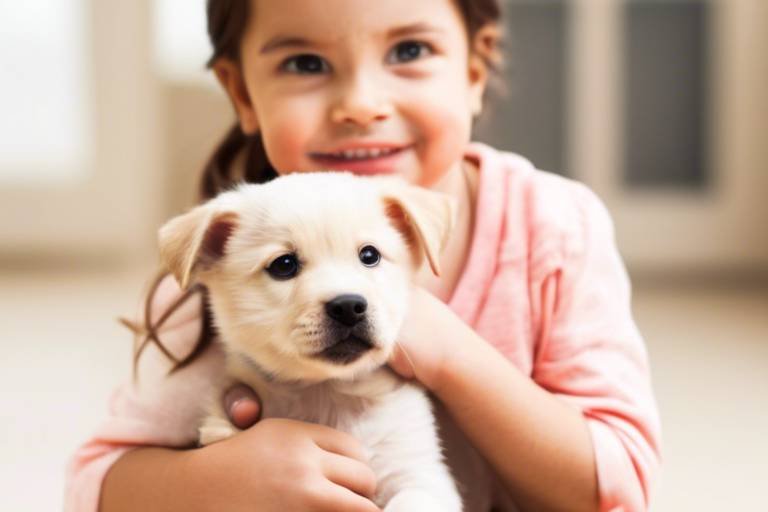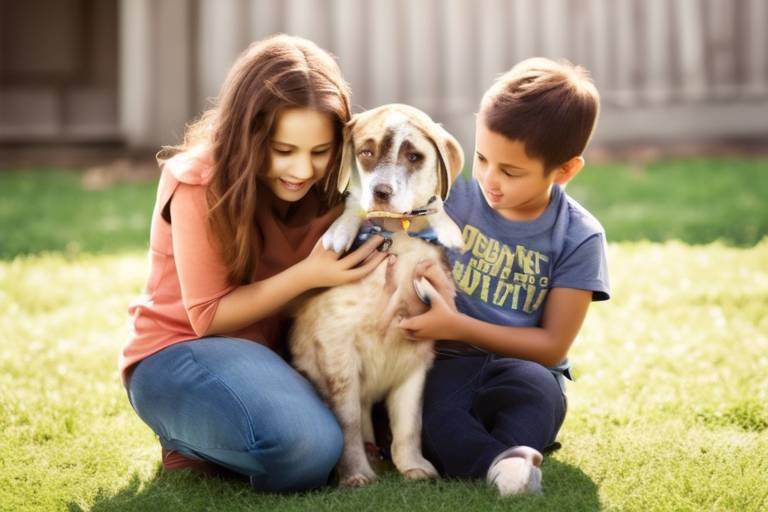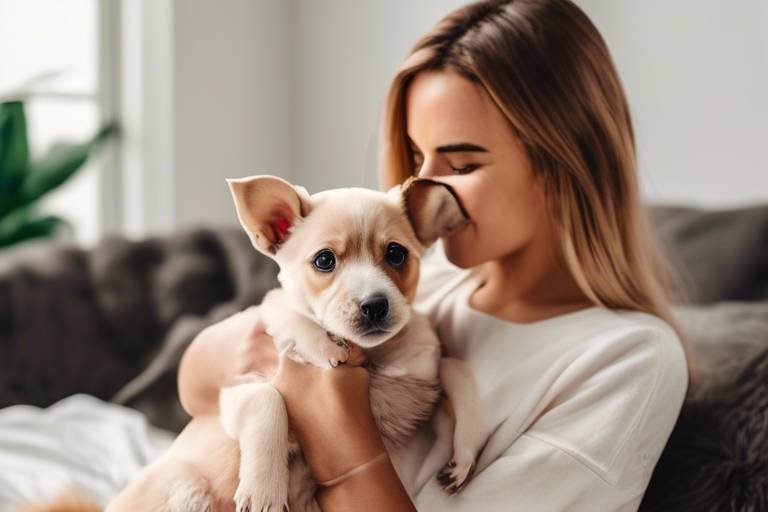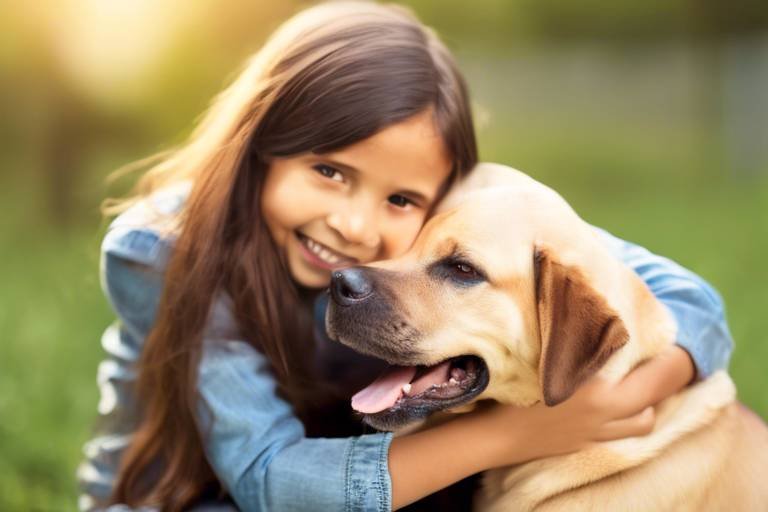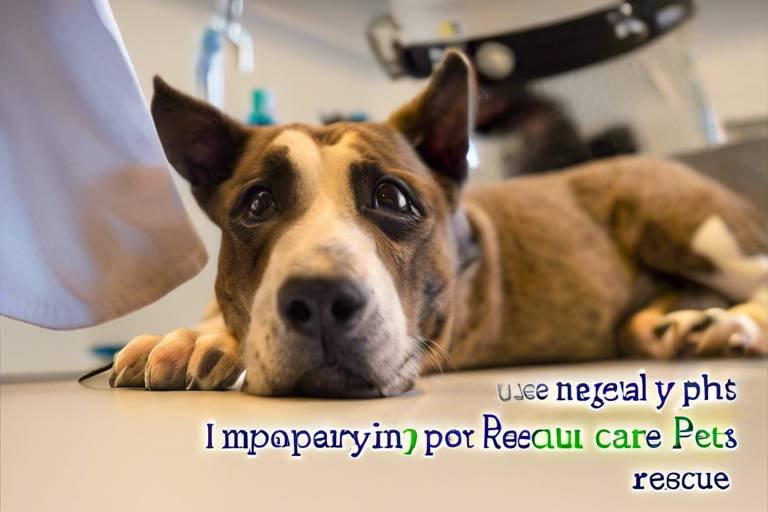The Lifelong Commitment of Pet Adoption
Adopting a pet is one of the most fulfilling decisions you can make, yet it comes with a weighty responsibility. It's not just about bringing home a furry friend; it’s about making a lifelong commitment to their well-being, happiness, and health. Imagine walking into your home after a long day and being greeted by an excited wagging tail or a gentle purr—those moments are priceless! However, they also come with the understanding that you are now responsible for another life, one that depends on you for everything from food and shelter to love and companionship.
When you choose to adopt, you're not just saving a life; you're enriching your own. The bond you create with your pet is unlike any other, filled with joy, laughter, and sometimes even challenges. Think of it as a partnership where both of you grow and learn together. The commitment to care for a pet means being there for them through thick and thin, just like you would for a family member. This means regular vet visits, daily exercise, and plenty of love and attention. Are you ready to embrace this journey?
As you embark on this rewarding path, it’s crucial to understand that the responsibilities don't end once you bring your new friend home. You’ll be tasked with ensuring their happiness and health for years to come. This commitment includes not only providing basic needs but also engaging in activities that stimulate their minds and bodies. Whether it’s teaching them tricks, going on walks, or simply cuddling on the couch, every moment counts.
Moreover, the joy of pet adoption extends beyond the initial thrill of bringing a pet home. It’s about the lasting impact they will have on your life. Studies show that pets can reduce stress, lower blood pressure, and even improve your mood. They offer unconditional love and companionship that can make the toughest days seem brighter. So, while the commitment may seem daunting at first, the rewards are immeasurable.
In conclusion, adopting a pet is a beautiful journey filled with responsibilities, challenges, and immense joy. It’s a promise to provide a loving home and to cherish the bond you will create. If you’re considering pet adoption, remember that it’s not just about finding a pet; it’s about finding a lifelong companion who will enrich your life in ways you never thought possible.
- What should I consider before adopting a pet? Evaluate your lifestyle, living conditions, and financial situation to ensure you can provide a stable environment for a pet.
- How do I prepare my home for a new pet? Pet-proof your space by removing hazards, gathering necessary supplies like food and bedding, and creating a safe area for them to adjust.
- What kind of training do pets need? Basic obedience training and socialization are crucial for your pet’s development and happiness.
- How often should I take my pet to the vet? Regular check-ups are essential; typically, once a year for healthy pets, and more frequently for older or sick animals.

The Importance of Commitment
This article explores the profound responsibilities and joys that come with adopting a pet, emphasizing the importance of commitment, care, and the positive impact on both the pet and the owner.
Adopting a pet is not just a fleeting decision; it requires a long-term commitment to their well-being, health, and happiness throughout their lives. Think of it like entering a lifelong partnership. Just as you would invest time and effort into a relationship with a friend or family member, adopting a pet demands the same dedication. Pets rely on us for everything—from food and shelter to love and companionship. When you bring a furry friend into your home, you’re not just gaining a pet; you’re gaining a family member who will depend on you for the rest of their life.
Many people often underestimate the responsibilities that come with pet ownership. It's essential to recognize that pets are not accessories; they are living beings with emotions, needs, and personalities. The commitment to care for a pet includes:
- Daily Care: Feeding, walking, grooming, and playing are just a few daily tasks that ensure your pet is happy and healthy.
- Health Maintenance: This involves regular vet visits, vaccinations, and medications, which can be time-consuming and costly.
- Training and Socialization: Pets require training to adapt to their new environment and to learn proper behavior, which takes time and patience.
It’s also important to consider the emotional commitment. Pets provide unconditional love and companionship, but they also experience feelings of anxiety, fear, and sadness. When you adopt a pet, you’re promising to be there for them through thick and thin, providing comfort during storms and joy during sunny days. This bond can be incredibly rewarding, but it’s vital to understand that it’s a two-way street; your pet will need you just as much as you need them.
Moreover, the commitment doesn’t end after the first few weeks of adjustment. Many pets, especially those from shelters, may require extra time to acclimate to their new surroundings. The initial excitement of bringing a pet home can quickly turn into a daunting reality when you realize they might have behavioral issues or health concerns that need addressing. This is where your commitment truly shines. Being patient and understanding during this transition period is crucial for building a strong and lasting bond.
In summary, adopting a pet is a profound commitment that should not be taken lightly. It’s a promise to provide care, love, and support throughout their lives. Just like any meaningful relationship, it requires effort, understanding, and a willingness to grow together. If you're ready to take on this challenge, the rewards are boundless, filled with joy, love, and companionship that enriches both your life and the life of your new furry friend.
Navigating the pet adoption process can be complex, involving various steps such as selecting the right pet, completing paperwork, and preparing your home for a new family member.
Selecting a pet that fits your lifestyle is crucial. Consider factors like size, breed, energy level, and temperament to ensure a harmonious match.
Different breeds have unique needs and characteristics. Understanding these can help prospective owners make informed decisions about which pet to adopt.
Evaluate your daily routine, living situation, and financial capacity to determine the type of pet that would best suit your life.
Creating a welcoming environment for your new pet involves pet-proofing your home and gathering necessary supplies to ensure their safety and comfort.
Establishing a connection with your adopted pet takes time and patience, but it leads to a rewarding relationship filled with love and companionship.
Proper training and socialization are essential for a well-adjusted pet. Investing time in these areas fosters trust and obedience.
Routine veterinary care is vital for maintaining your pet's health. Regular check-ups, vaccinations, and preventive treatments are part of responsible pet ownership.
Adopting a pet brings immense joy and fulfillment. The companionship, loyalty, and unconditional love from a pet can significantly enhance your quality of life.
Q: How long does the adoption process take?
A: The adoption process can vary depending on the shelter or rescue organization, but it typically takes a few days to a couple of weeks.
Q: What should I do if my adopted pet has behavioral issues?
A: Consult with a veterinarian or a professional trainer to address any behavioral concerns. Patience and consistency are key.
Q: Are there any financial commitments involved in pet ownership?
A: Yes, pet ownership includes costs for food, grooming, veterinary care, and other supplies.
Q: Can I adopt a pet if I have allergies?
A: Yes, consider adopting hypoallergenic breeds or consult with your doctor for advice on managing allergies.

Understanding the Adoption Process
Adopting a pet can feel like stepping into a whole new world, filled with excitement and, let’s be honest, a little bit of confusion. The adoption process is not just a simple transaction; it's a journey that involves several important steps to ensure that both you and your new furry friend are set up for success. Before you dive in, it’s crucial to understand what this process entails, as it will help you navigate the waters of pet ownership with confidence.
The first step in the adoption process is often choosing the right pet. This is where the magic begins! You might be drawn to a cute puppy or a charming older cat, but it’s essential to consider your lifestyle and the specific needs of the animal. For instance, if you lead a busy life, a more independent pet might be a better fit than a high-energy dog that requires constant attention. Think of it like matchmaking; you want to find that perfect companion who complements your way of life.
Once you’ve made your choice, the next phase involves completing the necessary paperwork. This can often feel overwhelming, but it’s a vital part of the process. Adoption agencies want to ensure that animals are going to loving and responsible homes. Expect to fill out an application that asks about your living situation, pet experience, and how you plan to care for your new family member. This step is not just a formality; it’s a way for the agency to gauge your readiness to provide a stable environment.
After your application is approved, it’s time to prepare your home for your new pet. This includes pet-proofing your space to ensure it’s safe and welcoming. Think about it as preparing for a house guest who might be a little clumsy! You’ll want to remove any hazardous items, secure loose wires, and ensure that your home is a safe haven. Additionally, gathering essential supplies such as food, a bed, toys, and grooming tools is crucial to make your new pet feel at home.
Throughout this entire process, communication with the adoption agency is key. They can provide invaluable resources, tips, and support to help you transition into pet ownership smoothly. Remember, adopting a pet is a lifelong commitment, and the adoption agency is there to help ensure that you and your new companion are a perfect match.
To further assist you in your journey, here are some common questions that many prospective pet adopters have:
- What should I expect during the adoption interview? Expect questions about your lifestyle, experience with pets, and your living situation. This helps the agency assess your readiness for pet ownership.
- Are there fees associated with pet adoption? Yes, most adoption agencies charge a fee that often covers vaccinations, spaying/neutering, and other necessary health checks.
- Can I adopt a pet if I have children? Absolutely! Many pets thrive in family environments, but it's essential to choose a pet that matches your children's ages and energy levels.
- What if I change my mind after adopting? Most agencies have policies in place for returning pets if the adoption doesn't work out. It's always best to discuss this with the agency beforehand.
Choosing the Right Pet
When it comes to adopting a pet, the phrase "choose wisely" couldn't ring more true. Your choice of pet will influence not only your daily routine but also your emotional well-being. Imagine bringing home a furry friend that doesn't quite match your lifestyle; it could lead to frustration for both you and your new companion. Therefore, it's crucial to consider several factors before making this lifelong commitment.
First and foremost, think about your living situation. Do you live in a cozy apartment or a spacious house? If you’re in an apartment, a smaller breed or a less active pet might be more appropriate. Larger dogs, such as Great Danes or German Shepherds, need space to roam and play. If you have kids or other pets, you’ll also want to ensure that the new addition can coexist peacefully with them.
Next, consider the energy level of the pet. Some breeds are known for their high energy and require daily exercise, while others are more laid-back and enjoy lounging around. If you lead an active lifestyle and enjoy outdoor activities, a dog that can keep up with you, like a Labrador Retriever or a Border Collie, might be the perfect fit. On the other hand, if you prefer a quieter life, a cat or a small dog like a French Bulldog could be more suitable.
Another essential factor is the temperament of the pet. Some pets are naturally more affectionate and sociable, while others may be shy or independent. For instance, Golden Retrievers are known for their friendly nature, making them great family pets. In contrast, some cats may prefer their alone time and might not be as cuddly. Understanding these characteristics can help you find a pet that aligns with your personality and lifestyle.
Lastly, it’s important to research the specific needs of different breeds. Each breed has its own set of health concerns, grooming requirements, and potential behavioral issues. For example, some breeds may require regular grooming to maintain their coats, while others may be prone to certain health conditions. By arming yourself with this knowledge, you can make an informed decision that benefits both you and your future pet.
In summary, choosing the right pet is about more than just picking a cute face. It’s about finding a companion that fits seamlessly into your life. Take the time to evaluate your lifestyle, preferences, and the specific needs of various breeds. After all, this is a decision that will affect both your life and the life of your new furry friend for years to come.
- What should I consider when choosing a pet? Consider your living situation, lifestyle, energy level, and the specific needs of different breeds.
- How do I know if a pet is right for me? Evaluate your daily routine and think about how much time and resources you can dedicate to a pet.
- Are there any breeds that are better for families? Yes, breeds like Golden Retrievers, Labradors, and Beagles are known for their friendly and sociable nature, making them great family pets.
Researching Breeds and Needs
This article explores the profound responsibilities and joys that come with adopting a pet, emphasizing the importance of commitment, care, and the positive impact on both the pet and the owner.
Adopting a pet is not just a fleeting decision; it requires a long-term commitment to their well-being, health, and happiness throughout their lives.
Navigating the pet adoption process can be complex, involving various steps such as selecting the right pet, completing paperwork, and preparing your home for a new family member.
Selecting a pet that fits your lifestyle is crucial. Consider factors like size, breed, energy level, and temperament to ensure a harmonious match.
When it comes to pet adoption, researching breeds and their specific needs is a fundamental step that should never be overlooked. Each breed has unique characteristics, temperaments, and care requirements that can significantly affect your experience as a pet owner. For instance, some breeds are known for their high energy levels and require extensive exercise and mental stimulation, while others may be more laid-back and suited for a quieter home environment.
Before making a decision, take the time to explore various breeds. This can involve reading books, visiting websites, or talking to breeders and shelter staff. Understanding the breed's history can provide insight into its behavior and needs. For example, herding breeds like Border Collies are intelligent and require a job to do, whereas a breed like the Bulldog is typically more relaxed and enjoys lounging around.
Additionally, consider the following factors when researching:
- Size: Larger breeds may need more space and exercise, while smaller breeds can adapt to smaller living areas.
- Temperament: Some pets are more social and friendly, while others may be reserved or protective.
- Grooming Needs: Certain breeds require regular grooming and maintenance, which can influence your time and budget.
- Health Considerations: Be aware of any breed-specific health issues that may arise, as these can affect your pet's quality of life.
Ultimately, the goal is to find a pet whose needs align with your lifestyle. This alignment not only enhances the well-being of your pet but also enriches your life. After all, adopting a pet is like entering into a lifelong friendship—one that thrives on understanding, patience, and love.
Establishing a connection with your adopted pet takes time and patience, but it leads to a rewarding relationship filled with love and companionship.
Proper training and socialization are essential for a well-adjusted pet. Investing time in these areas fosters trust and obedience.
Routine veterinary care is vital for maintaining your pet's health. Regular check-ups, vaccinations, and preventive treatments are part of responsible pet ownership.
Adopting a pet brings immense joy and fulfillment. The companionship, loyalty, and unconditional love from a pet can significantly enhance your quality of life.
Q: How do I know if I'm ready to adopt a pet?
A: Assess your lifestyle, financial situation, and commitment level. Make sure you have the time and resources to care for a pet.
Q: What should I do if I have allergies?
A: Consider hypoallergenic breeds and consult with a veterinarian for advice on managing allergies.
Q: How can I prepare my home for a new pet?
A: Pet-proof your home by removing hazards, gathering supplies, and creating a comfortable space for your pet.
Q: What if I have other pets?
A: Introduce new pets slowly and monitor their interactions to ensure a smooth transition.
Assessing Your Lifestyle
Before diving headfirst into the world of pet adoption, it's crucial to take a step back and assess your lifestyle. Think of it as laying the groundwork for a beautiful relationship that will blossom over the years. After all, bringing a pet into your home is like inviting a new family member who will rely on you for love, care, and companionship. So, what should you consider?
First and foremost, evaluate your daily routine. Do you work long hours? Are you often away from home? Pets, especially dogs, thrive on companionship and interaction. If your schedule is packed, you might want to consider a more independent pet, like a cat or a small animal, that can handle being alone for longer periods. On the flip side, if you have ample time to spend with a pet, the possibilities are endless!
Next, take a look at your living situation. Do you live in a cozy apartment or a sprawling house? The size of your living space can significantly influence the type of pet that would be a good fit for you. For instance, larger breeds may require more room to roam and play, while smaller pets can adapt well to tighter spaces. Additionally, think about whether you have a yard or access to parks for outdoor activities. A dog, especially, will appreciate a good run or playtime in the fresh air!
Another vital factor is your financial capacity. Owning a pet comes with its fair share of expenses, from food and grooming to veterinary care and emergency treatments. It’s not just a one-time cost; it’s a long-term financial commitment. Consider creating a budget that includes:
- Food and treats
- Regular vet check-ups
- Vaccinations and preventive medications
- Grooming supplies or services
- Training classes, if necessary
- Pet insurance (optional but recommended)
Lastly, think about your future plans. Are you considering moving, starting a family, or traveling more in the coming years? Pets are a long-term commitment, and you must be prepared for the changes that life may bring. A pet is not just a temporary companion; they are a lifelong commitment that requires your dedication and love.
In conclusion, assessing your lifestyle isn't just about checking boxes; it's about understanding how a pet will fit into your life and how you can create a nurturing environment for them. Taking the time to reflect on these aspects will help ensure that both you and your future pet will lead a happy and fulfilling life together.
- How do I know if I'm ready to adopt a pet? - Consider your time, financial situation, and living arrangements. If you can provide a stable and loving environment, you might be ready!
- What if my lifestyle changes after I adopt a pet? - It's important to be adaptable. If significant changes occur, assess how they might affect your pet and make necessary adjustments to ensure their well-being.
- Can I adopt a pet if I have allergies? - Yes, some breeds are hypoallergenic, and there are many ways to manage allergies while enjoying the company of a pet.
Preparing Your Home
Welcoming a new pet into your home is an exciting adventure, but it also requires some thoughtful preparation. Just like you would prepare for a new family member, your home needs to be ready for the arrival of your furry friend. This means creating a safe, comfortable, and inviting environment that caters to their needs. First and foremost, you need to pet-proof your living space. This involves removing any items that could be hazardous to your new companion, such as toxic plants, cords, and small objects that could be swallowed. Think of it as creating a safe playground where your pet can explore without the risk of injury.
Next, consider gathering the essential supplies that your pet will need. This includes food and water bowls, a comfortable bed, toys to keep them entertained, and, of course, food appropriate for their age and size. Imagine how you would feel if you moved into a new place without any of your belongings; your pet deserves to feel just as comfortable and at home. You might also want to set up a designated area where your pet can retreat to when they need some quiet time. This could be a cozy corner with their bed and a few toys, providing them with a sense of security.
In addition to physical preparations, it's important to think about your home's layout. If you have stairs, for instance, consider how your new pet will navigate them. Some breeds may struggle with stairs, while others might take to them like a pro. If you have valuable items or fragile decorations, it might be wise to relocate them to higher shelves or secure them in a way that prevents accidents. A little foresight can save you from a lot of heartache later on.
Finally, don't forget to inform your family members and any other pets about the new addition. It's crucial that everyone is on the same page about how to interact with the new pet, especially during the initial adjustment period. You might even want to set some ground rules to ensure that your new pet feels welcomed and loved, rather than overwhelmed. After all, a happy pet makes for a happy home!
- How long does it take for a pet to adjust to a new home? Every pet is different, but it typically takes a few days to a few weeks for a pet to feel comfortable in their new environment.
- What supplies do I need to prepare before adopting a pet? Essential supplies include food and water bowls, a bed, toys, food, a collar and leash, and a safe space for your pet.
- Should I introduce my new pet to my other pets immediately? It's best to introduce them gradually, allowing both your new pet and existing pets to adjust to each other's presence slowly.
- How can I make my home safe for my new pet? Pet-proof your home by removing toxic plants, securing cords, and ensuring small objects are out of reach.
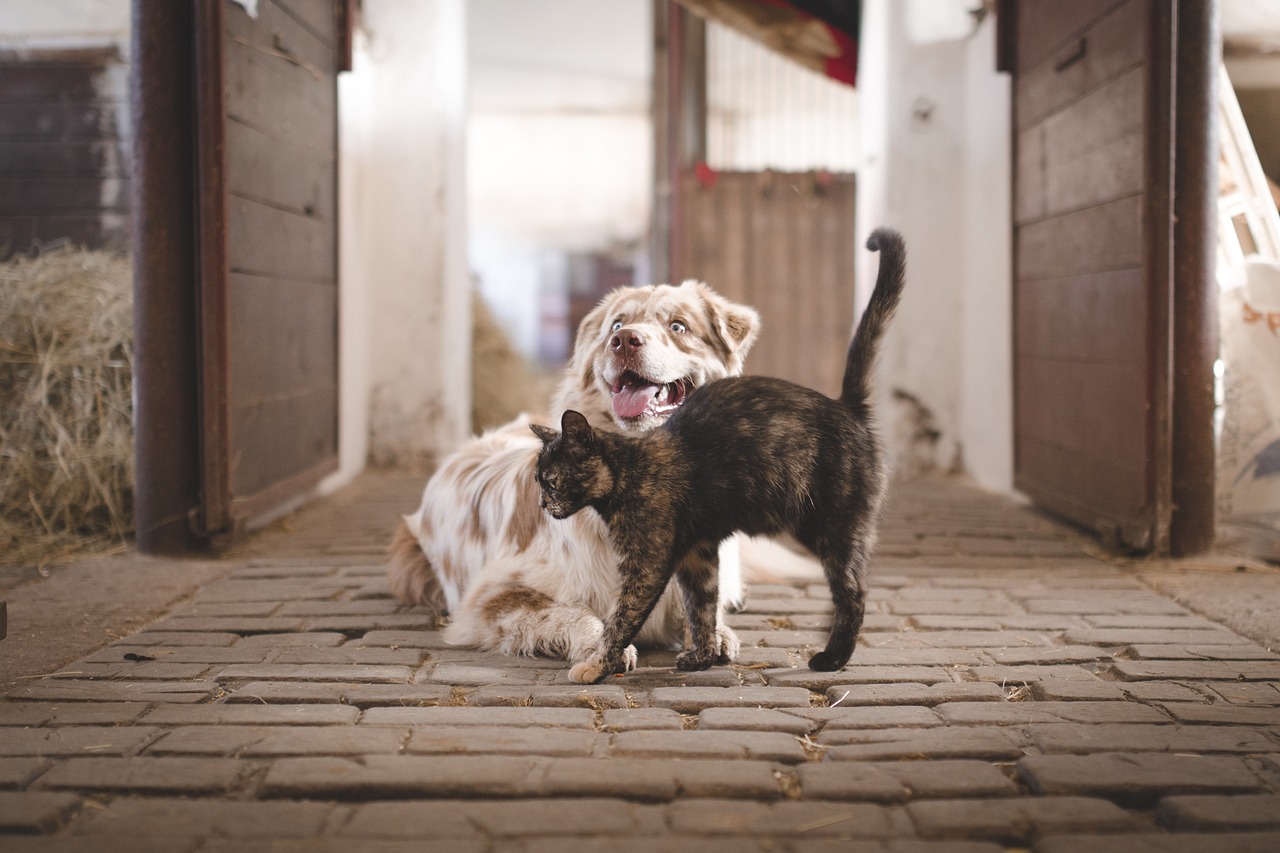
Building a Strong Bond
Establishing a strong bond with your newly adopted pet is like nurturing a beautiful garden; it takes time, patience, and a bit of effort to flourish. At first, your pet may be shy or anxious, especially if they’ve come from a difficult background. But don’t worry! With consistent love and care, you’ll soon find that your pet can become your best friend. Think of this bond as a delicate thread that you weave together through shared experiences, trust, and understanding.
One of the foundational elements of building this bond is training and socialization. Just like humans, pets need to learn how to interact with their environment and the people in it. Training your pet isn’t just about teaching them commands; it’s about creating a language between you two. When you invest time in training, you’re not only teaching them how to behave but also fostering a sense of security and trust. A well-trained pet feels confident, which in turn helps strengthen your relationship. Consider incorporating positive reinforcement techniques such as treats or praises. This approach not only encourages good behavior but also makes the training sessions enjoyable for both of you!
Socialization is equally important. Exposing your pet to different environments, people, and other animals helps them become well-adjusted companions. Whether it’s a trip to the park or a casual walk around the neighborhood, these experiences are vital. They help your pet learn how to react to various stimuli, reducing anxiety and fear. Just like humans, pets thrive on social interactions. A well-socialized pet is not only happier but also more adaptable to new situations.
Another crucial aspect of building a strong bond is maintaining regular veterinary visits. Just like we visit doctors for check-ups, our pets need the same level of care. Routine vet visits ensure that your pet stays healthy and helps you catch any potential issues early on. This not only keeps your pet in tip-top shape but also reassures them that you care about their well-being. Remember, a healthy pet is a happy pet, and a happy pet is more likely to bond with you!
As you embark on this journey of bonding with your pet, don’t forget the power of quality time. Spend time playing, cuddling, or simply being together. Create rituals that you both enjoy, whether it’s a daily walk, playtime with their favorite toy, or snuggling on the couch during movie nights. These shared moments build trust and create lasting memories. Just like any relationship, the more you invest in it, the stronger it becomes.
In summary, building a strong bond with your adopted pet is a rewarding journey that involves patience, love, and commitment. By focusing on training, socialization, regular vet visits, and spending quality time together, you’ll create a relationship filled with joy and companionship. Remember, every little effort you make is a step towards a deeper connection with your furry friend!
- How long does it take to bond with a newly adopted pet?
The bonding process can vary depending on the pet's background and personality. Some pets may warm up quickly, while others may take weeks or even months. Patience is key!
- What are some signs that my pet is bonding with me?
Signs include seeking your attention, following you around, cuddling, and displaying relaxed body language. If your pet seems comfortable around you, that’s a great sign!
- Can I train my pet at home?
Absolutely! Home training can be very effective. There are plenty of resources available online, or consider enrolling in a local training class for structured guidance.
Training and Socialization
When you bring a new pet into your home, you're not just gaining a furry companion; you're also taking on the responsibility of training and socializing them. This process is crucial for developing a well-adjusted pet that can thrive in various environments. Think of training as the foundation of a house—without it, everything else is likely to crumble. Socialization, on the other hand, is like the paint and decor that make your house a home; it enhances the overall experience for both you and your pet.
Training your pet is essential for establishing boundaries and expectations. It’s not merely about teaching commands like "sit" or "stay"; it's about building a communication bridge between you and your pet. A well-trained pet is not only safer but also more enjoyable to be around. Imagine the relief of knowing your dog won’t bolt out the door every time it opens. To get started, consider using positive reinforcement techniques, which involve rewarding your pet for desired behaviors. This could be treats, praise, or playtime—whatever motivates your furry friend!
Socialization is equally important, especially for puppies and young animals. Exposing your pet to different people, environments, and other animals helps them develop confidence and reduces the likelihood of fear-based behaviors. Think of it as introducing your pet to the world outside; the more experiences they have, the more adaptable they become. Here are some key points to keep in mind:
- Start early: The critical window for socialization is between 3 and 14 weeks of age.
- Variety is key: Expose your pet to various sights, sounds, and smells.
- Monitor interactions: Ensure that your pet has positive experiences with new encounters.
Regular training sessions should be short and fun to keep your pet engaged. Aim for about 5 to 10 minutes per session, and gradually increase the complexity of the tasks as your pet learns. Consistency is vital; use the same commands and rewards to reinforce behaviors. Over time, you’ll find that not only does your pet learn faster, but the bond between you strengthens as well.
In conclusion, investing time in training and socialization is an investment in your pet's happiness and your peace of mind. The effort you put in will pay off in the form of a well-mannered, confident companion who can navigate the world with you. Remember, patience and love go a long way—your pet is learning just as much about you as you are about them!
Q: How long does it take to train a pet?
A: The timeline varies by pet and the complexity of the commands. Basic training can take a few weeks, while more advanced training may take several months.
Q: What is the best age to start socializing my pet?
A: Ideally, you should start socializing your pet during their critical development window, which is between 3 and 14 weeks of age.
Q: Can I train my pet myself, or should I hire a professional?
A: You can definitely train your pet yourself, especially with the abundance of resources available. However, if you encounter challenges, seeking a professional trainer can be beneficial.
Regular Vet Visits
This article explores the profound responsibilities and joys that come with adopting a pet, emphasizing the importance of commitment, care, and the positive impact on both the pet and the owner.
Adopting a pet is not just a fleeting decision; it requires a long-term commitment to their well-being, health, and happiness throughout their lives.
Navigating the pet adoption process can be complex, involving various steps such as selecting the right pet, completing paperwork, and preparing your home for a new family member.
Selecting a pet that fits your lifestyle is crucial. Consider factors like size, breed, energy level, and temperament to ensure a harmonious match.
Different breeds have unique needs and characteristics. Understanding these can help prospective owners make informed decisions about which pet to adopt.
Evaluate your daily routine, living situation, and financial capacity to determine the type of pet that would best suit your life.
Creating a welcoming environment for your new pet involves pet-proofing your home and gathering necessary supplies to ensure their safety and comfort.
Establishing a connection with your adopted pet takes time and patience, but it leads to a rewarding relationship filled with love and companionship.
Proper training and socialization are essential for a well-adjusted pet. Investing time in these areas fosters trust and obedience.
Routine veterinary care is vital for maintaining your pet's health. Regular check-ups, vaccinations, and preventive treatments are part of responsible pet ownership. Just like we humans need regular health check-ups to catch any issues early, our furry friends require the same attention. Imagine your pet as a delicate clock; if one cog isn’t working right, the whole mechanism can falter. By scheduling regular vet visits, you ensure that your pet remains in tip-top shape.
During these visits, veterinarians perform essential tasks such as:
- Physical Examinations: A thorough examination helps spot any underlying health issues.
- Vaccinations: Keeping your pet up-to-date on vaccinations protects them from various diseases.
- Preventive Care: This includes treatments for parasites like fleas and ticks, as well as dental care.
Additionally, these visits offer a chance for you, as an owner, to discuss any behavioral concerns or dietary questions with your vet. Remember, your vet is your partner in ensuring your pet's health and happiness. Keeping a record of your pet’s vet visits and any treatments can also be beneficial, as it helps track their health over time.
In summary, regular vet visits are not just a box to tick off on your pet care checklist; they are a fundamental aspect of being a responsible pet owner. By prioritizing these visits, you are investing in your pet’s long-term health and well-being, which ultimately enhances the quality of your shared life together.
Adopting a pet brings immense joy and fulfillment. The companionship, loyalty, and unconditional love from a pet can significantly enhance your quality of life.
Q: How often should I take my pet to the vet?
A: Generally, adult pets should have a check-up at least once a year, while puppies and kittens may need more frequent visits.
Q: What should I expect during a vet visit?
A: Expect a physical examination, vaccinations, and discussions about your pet's diet and behavior.
Q: Are vet visits expensive?
A: Costs can vary, but regular check-ups are an essential investment in your pet’s health.

The Joys of Pet Adoption
Adopting a pet is like opening a door to a world filled with unconditional love and companionship. Imagine coming home after a long day and being greeted by a wagging tail or a gentle purr. Pets have an incredible ability to lift our spirits and fill our lives with joy. The bond you form with your furry friend is unlike any other, and it’s a relationship built on trust, loyalty, and mutual affection.
One of the most profound joys of pet adoption is the sense of purpose it brings. Caring for a pet means you have someone who relies on you, creating a rewarding routine that can enhance your mental well-being. Studies have shown that pet owners often experience reduced levels of stress and anxiety. Just think about it: when you stroke your cat or take your dog for a walk, those simple actions can lead to a flood of feel-good hormones, making you feel happier and more fulfilled.
Furthermore, adopting a pet not only changes your life but also transforms the life of an animal in need. Many pets in shelters are waiting for a loving home, and by choosing to adopt, you’re giving them a second chance at happiness. It’s a beautiful cycle of love; your new pet will shower you with affection, gratitude, and loyalty, making every moment spent together incredibly rewarding.
Let’s not forget the joy of playtime. Whether it’s tossing a ball for your dog or engaging in a playful game of chase with your cat, these moments create lasting memories. Pets have a unique way of reminding us to embrace our inner child, encouraging us to laugh, play, and enjoy the little things in life. Plus, they can be great exercise partners, helping you stay active and healthy!
And speaking of health, did you know that pet ownership can lead to a more active lifestyle? Dogs, in particular, require regular walks, which means you’ll be getting your steps in while bonding with your furry friend. This mutual benefit can lead to a healthier lifestyle for both you and your pet.
In addition to physical health, pets can also enhance your social life. They can be excellent conversation starters and help you connect with other pet lovers. Whether it’s at the dog park or during community events, having a pet often leads to new friendships and a sense of belonging within a community.
To summarize, the joys of pet adoption are vast and multifaceted. From the emotional benefits of companionship and love to the physical advantages of an active lifestyle, adopting a pet can significantly improve your overall quality of life. So, if you’re considering bringing a furry friend into your home, remember that you’re not just changing their life; you’re enriching your own in ways you may never have imagined!
- What are the benefits of adopting a pet? Adopting a pet provides companionship, reduces stress, encourages a more active lifestyle, and gives a homeless animal a second chance.
- How do I know if I’m ready to adopt a pet? Consider your lifestyle, financial situation, and ability to commit time and care to a pet. If you can provide a stable environment, you may be ready.
- What should I do before bringing a pet home? Prepare your home by pet-proofing it, gathering necessary supplies, and ensuring you have a plan for their care and training.
Frequently Asked Questions
- What should I consider before adopting a pet?
Before adopting a pet, it's essential to evaluate your lifestyle, living situation, and financial capacity. Think about your daily routine and how much time you can dedicate to a pet. Different pets have varying needs, so consider factors like size, breed, energy level, and temperament to ensure a good match.
- How do I choose the right pet for my family?
Choosing the right pet involves researching different breeds and understanding their unique characteristics. Consider your family's activity level, any allergies, and the amount of space you have. A pet that complements your lifestyle will lead to a happier relationship for both you and your new furry friend.
- What is the adoption process like?
The adoption process can vary by organization, but it typically includes filling out an application, meeting potential pets, and sometimes undergoing a home visit. Be prepared to answer questions about your lifestyle and how you plan to care for your new pet. This helps ensure that the adoption is a good fit for both you and the animal.
- How can I prepare my home for a new pet?
Preparing your home for a new pet involves pet-proofing your space by removing hazards like toxic plants, securing loose wires, and storing away harmful chemicals. Additionally, gather essential supplies such as food, water bowls, a bed, toys, and a litter box (if applicable) to create a comfortable environment for your new friend.
- Why is regular vet care important for my pet?
Regular veterinary care is crucial for maintaining your pet's health. Routine check-ups, vaccinations, and preventive treatments help catch any potential health issues early and ensure your pet lives a long, healthy life. Just like humans, pets need regular health assessments to stay in top shape!
- How do I build a strong bond with my adopted pet?
Building a strong bond with your adopted pet takes time and patience. Engage in regular play, training, and socialization to foster trust and understanding. The more time you spend together, the deeper your relationship will grow, leading to a fulfilling companionship filled with love.
- What are the emotional benefits of adopting a pet?
Adopting a pet can bring immense joy and fulfillment. The companionship, loyalty, and unconditional love from a pet can significantly enhance your quality of life. Many pet owners report feeling less lonely and more connected to their pets, which can lead to improved mental health and overall happiness.



